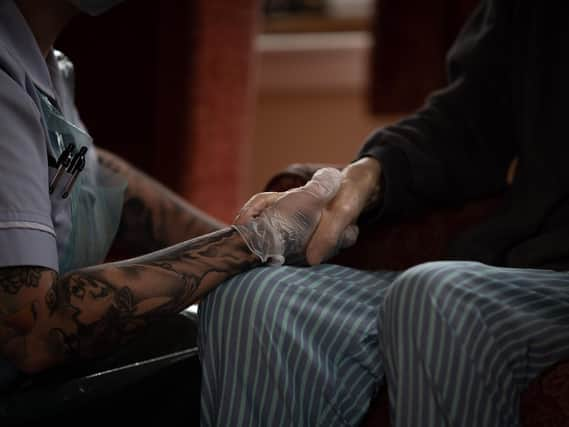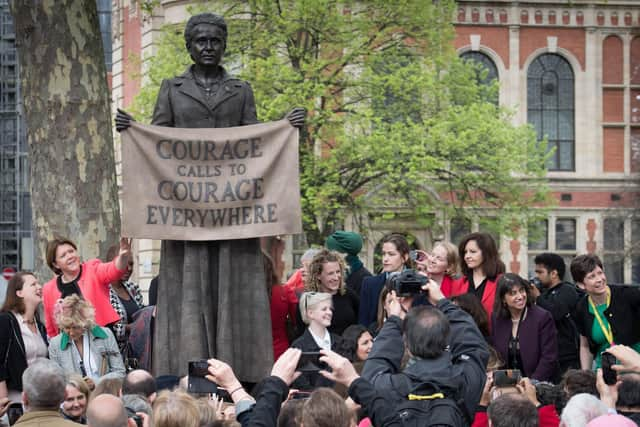Call to improve pay for care workers by leading women’s rights charity


Research by the Fawcett Society among more than 2,000 adults found overwhelming support for carers to be better paid.
Seven out of 10 Conservative supporters said they would back a rise in income tax to fund a pay rise, said the report.
Advertisement
Hide AdAdvertisement
Hide AdThe research, in the week of the 50th anniversary of the Equal Pay Act, showed that half of adults polled did not believe that the Government prioritised care homes enough at the start of the pandemic while three out of four respondents said care workers were underpaid.


Sam Smethers, Fawcett Society chief executive, said: "This crisis has revealed how much we rely on frontline workers, particularly low-paid care workers, yet how poorly they are treated.
"The truth is Government did not prioritise the care sector at the start and the public are clear on that. This must change. As a minimum it is time to properly protect them, give them decent terms and conditions and start paying them a living wage.
"Fifty years on from the Equal Pay Act it is time to go to the heart of why women are still undervalued, and that is because we do not value care work, whether it is paid or unpaid.
Advertisement
Hide AdAdvertisement
Hide Ad"The Chancellor could give care workers a pay rise tomorrow if he chose to and our poll shows that the wider public, including the vast majority of Conservative voters, would support it."


The society is the UK’s leading membership charity campaigning for gender equality and women’s rights at work, at home and in public life.
It is named after Millicent Fawcett, a suffragist and women's rights campaigner who made it her lifetime’s work to secure women the right to vote. At the age of 19, she organised signatures for the first petition for women’s suffrage, though she was too young to sign it herself.
She became president of the National Union of Women’s Suffrage Societies (the NUWSS) from 1907-19. With 50,000 members it was the largest organisation agitating for female suffrage at the time. Her powerful and peaceful mass campaign was instrumental in securing the first extension of voting rights for women in 1918.
Advertisement
Hide AdAdvertisement
Hide AdFrances O’Grady, general secretary of Trades Union Congress, said: "Care workers have been on the front line of this pandemic, putting their own health on the line to care for the elderly, sick and vulnerable. Many have lost their lives.
"Public support for action is overwhelming. Ministers must get serious about fixing our care sector and giving care workers the pay and respect they deserve".
________________________________
Editor’s note: first and foremost - and rarely have I written down these words with more sincerity - I hope this finds you well.
Almost certainly you are here because you value the quality and the integrity of the journalism produced by The Yorkshire Post’s journalists - almost all of which live alongside you in Yorkshire, spending the wages they earn with Yorkshire businesses - who last year took this title to the industry watchdog’s Most Trusted Newspaper in Britain accolade.
Advertisement
Hide AdAdvertisement
Hide AdAnd that is why I must make an urgent request of you: as advertising revenue declines, your support becomes evermore crucial to the maintenance of the journalistic standards expected of The Yorkshire Post. If you can, safely, please buy a paper or take up a subscription. We want to continue to make you proud of Yorkshire’s National Newspaper but we are going to need your help.
Postal subscription copies can be ordered by calling 0330 4030066 or by emailing [email protected]. Vouchers, to be exchanged at retail sales outlets - our newsagents need you, too - can be subscribed to by contacting subscriptions on 0330 1235950 or by visiting www.localsubsplus.co.uk where you should select The Yorkshire Post from the list of titles available.
If you want to help right now, download our tablet app from the App / Play Stores. Every contribution you make helps to provide this county with the best regional journalism in the country.
Sincerely. Thank you.
James Mitchinson